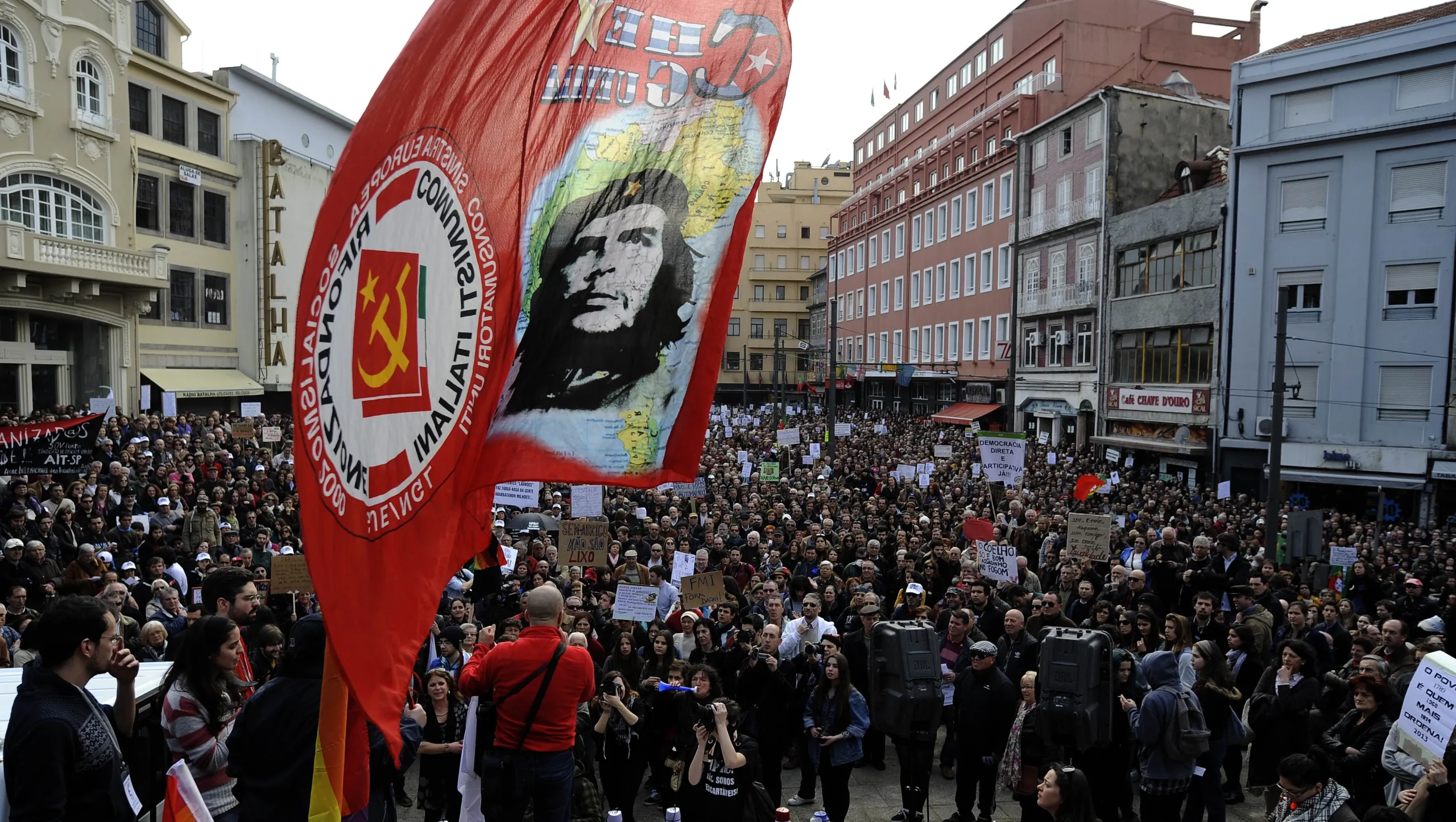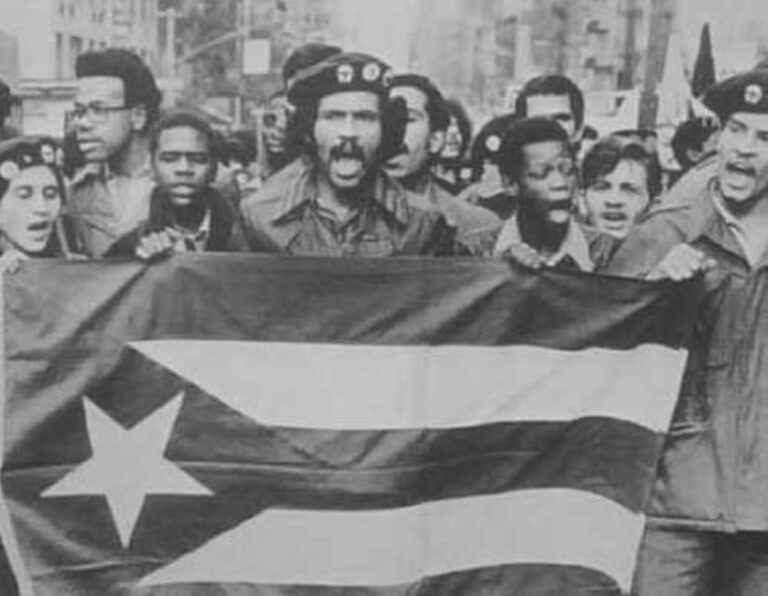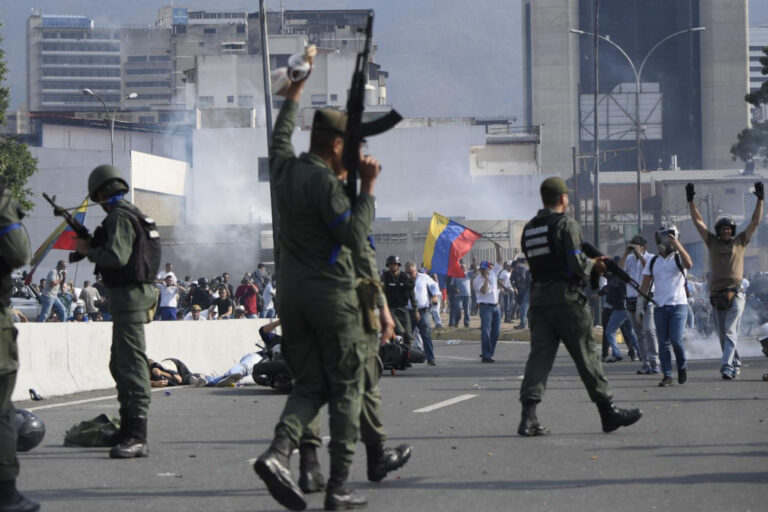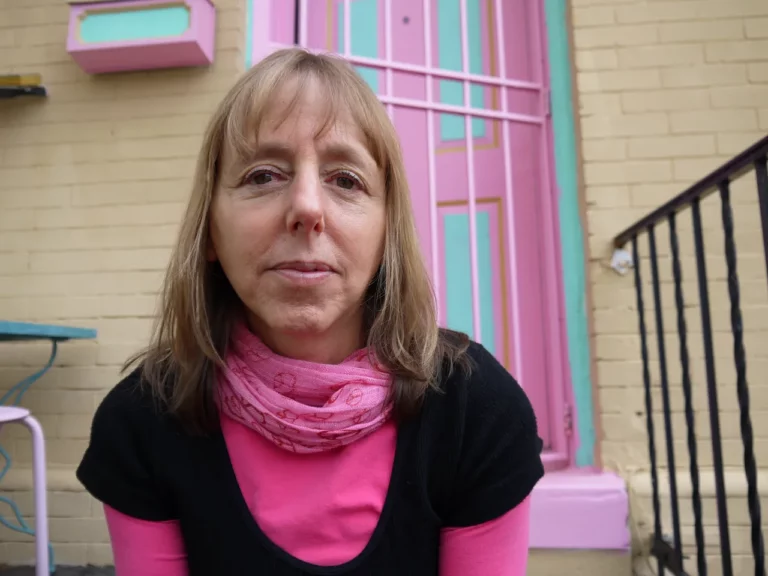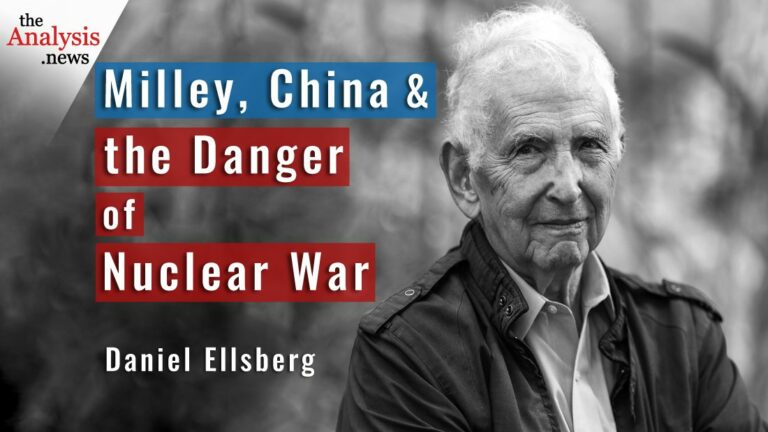Revolutionary Expectations and the Fight Against Austerity – Catarina Principe on RAI (2/5)
This interview was originally published on July 19, 2015. On Reality Asserts Itself, Ms. Principe discusses the rise of the anti-austerity movement in Portugal that culminated in a 2013 protest of more than a million people.
PAUL JAY, SENIOR EDITOR, TRNN: Welcome back to Reality Asserts Itself on The Real News Network. I’m Paul Jay. On March 2 in Portugal, a million and a half people protested against austerity. That was the biggest protest in–I guess in modern times, but it was also the last, ’cause since then there hasn’t been such an upsurge in the movement, and the left party right now is doing about 5 percent in the polls. So how did we get from there to here? And in many ways Catarina Príncipe’s life kind of was–intertwined all of these ups and downs in the Portuguese mass movement. And she joins us again now to tell us the story. Thanks for joining us again. So just one more time, Catarina is a social activist from Portugal. She organizes with the Left Bloc in Portugal and Die Linke in Germany, and she writes and works with Jacobin magazine. So you join the high school movement, as we found out in the last episode, and you’re 15, and you become an activist, and this is in between 2000, 2001 and this big upsurge in 2012, 2013. Talk a bit about sort of the ups and downs of the movement, and then why–we’ll get to this question, but we’re heading towards why wasn’t it able to sustain itself with–a million and a half people in the streets is pretty big. But take us through how we get to there, and then–.
CATARINA PRÍNCIPE, SOCIAL ACTIVIST: Take us through how we get from 2002 to 2012.
JAY: Yeah, just sort of a few big beats. A few big beats.
PRÍNCIPE: Okay. So I would say there is an important–there is a very–okay, there’s a couple of important things that happened. Like, so, in ’99, just to go a couple of years back, the broad left party Left Bloc forms. This is a kind of a new–it’s a new broad left, like, colorful, young party in the Portuguese political landscape, which attracts a lot of people that were not organized in politics, and also a lot of young people. And I think this is a crucial development in Portuguese politics. And the Left Bloc grows steadily until 2011. So in 2009 it reaches the peak. We get, like, around 10 percent.
JAY: In the elections.
PRÍNCIPE: In the national elections.
JAY: Which gives you what? About 16 seats in the parliament. Yeah.
PRÍNCIPE: Sixteen seats, yes, exactly 16. And yeah. And so there is, like, a rise of Bloco, a continuous rise, like, slowly but steady, until 2009. There are important moments, I would say. Maybe just I’ll mention a couple of them. There’s a very, very important social movement in 2007, 2006, 2007, for the legalization or the depenalization, decriminalization of abortion in Portugal, which had to be done through a national referendum. We won. That’s a very important victory for and also a learning process for a lot of activists, how to work together with many different associations and so on. Also in 2007, we started–and I was active there–we start in 2007 the anti-precarity movement in Portugal. So our analysis is that precarity is, like–.
JAY: Now, this is not a word we use that much here, but this is people that have precarious jobs. For example part-time–
PRÍNCIPE: Yes, part-time.
JAY: –or contract or freelance.
PRÍNCIPE: Yes.
JAY: And the word–I mean, it is an English word, but we don’t use it that much–precarity movement meaning people in these precarious jobs.
PRÍNCIPE: Exactly.
JAY: Go on.
PRÍNCIPE: There’s also a particular form of precarious employment in Portugal which we call the green receipt, which is, like, supposedly to–it exists to be used by freelancers, but actually a lot of companies and the state as a primary employer uses these sort of, like, receipts to make contracts with workers so that they don’t have to pay them Social Security, unemployment money, and so on and so forth. So that is a very particular form that precarious employment takes in Portugal. So we started–so our analysis is basically that precarity is on the rise.
JAY: And we’re seeing a great deal of that in the United States.
PRÍNCIPE: Yes.
JAY: An enormous amount.
PRÍNCIPE: Exactly.
JAY: In fact, most of the job growth in the United States, I think, has been in this sort of precarious segment, part-time jobs and not enough hours to actually get benefits and things.
PRÍNCIPE: Yeah, or, like, subcontracting companies, for example, which also exists too. I mean, it’s not new for you, but it was, it’s new for us, so to say. It was a very big shift on the composition or in the structuring of the labor market that had been slowly happening since the ’80s.
JAY: Same thing in Canada, too.
PRÍNCIPE: Exactly. Same thing in–I mean, same thing more or less all over. The question in Portugal was, I think, also, like, the speed of it. It was very fast. The changes were very fast. So in 2007–.
JAY: Let me just interrupt just for a sec for people. Just in case you didn’t watch part one–and you really should watch part one, ’cause it kind of contextualizes all of this, but we’re dealing with a Portugal that had emerged from a revolution with a lot of social safety net, a lot of labor protection rights and free education and free health care and all kinds of things. So as we’re talking the period from 2000 forward, it’s a real intensification on the part of the elites to undo a lot of those victories.
PRÍNCIPE: It’s true, just basically to completely dismantle the structures on how, like, labor was organized. And the problem was, according to our analysis, the anti-precarity movement analysis, was that–and I think it is correct–the trade unions were not capable of giving a satisfactory answer to this reality, because one of the important questions is that people in Portugal can only organize into sectorial trade unions, so they can only organize when they’re–you know, you have a workplace, you have a contract, and then you can organize in the trade union that organizes your workplace. And because most of precarious jobs last six months, one year, you change sectors all the time and you cannot be a member of the trade union as a whole, because the structure of the trade unions is different–or I don’t know how exactly how it is here. I think it’s maybe similar, but it’s different in other parts of Europe. A lot of–most of these people were not organized. And there was also a sort of a scapegoating happening in the unions. So unionized older workers were saying that this was the fault of the young workers, they were accepting to work in these conditions, instead of understanding that they didn’t have any other choice, because in–I think these numbers are from 2010, ’09, of–how do you say this? Nine in each ten jobs.
JAY: Nine out of ten. Yeah.
PRÍNCIPE: Nine out of ten jobs, new jobs that were created were precarious. So nine of–in–nine in–
JAY: Nine out of jobs.
PRÍNCIPE: –nine out of ten young people that start working were precarious. So 90 percent of the young people were basically working under precarious conditions. And so, because the trade unions could not give an answer to this, we needed something, and we needed a movement against this. And so this movement takes up a kind of a structure that was developing in Europe that started in Milan in Italy in 2001, which were called the Euro May Day parades, which is a kind of, like, young, colorful way of, like, engaging especially young people, young workers, and trying to organize away from the point of production, so away from the place where you actually work, because you cannot organize there, but try to create a collective narrative and a collective identity around this idea.
JAY: How big a role does social media play in this?
PRÍNCIPE: Not much in the beginning. It wasn’t that big. But it–or it did play one important role, I think. When we started, we started talking about precarity, and no one recognized the word. Like, we had, like, people in the government saying precarity shouldn’t be used, it doesn’t make any sense, because tendentially all jobs are going to be precarious anyway, so why are you using that definition? And, like, no one recognized themselves under this, you know, labor identity, so to say. And I think this is something that we have achieved. Like, precarity is a word that is used every day in newspapers and TV in Portugal. Everyone knows what it means, and people can identify their labor condition as precarious or not. So this is something that we actually have managed to do. And because we were, like, kind of a novelty in the Portuguese political landscape as a movement that–and this is the reason why also we–why we were a novelty was because we decided to organize with the idea that we call precarity in life, so understanding that precarious working conditions affect different segments of the population differently. They affect women in a particular way, young people in a particular way, migrants in a particular way. So we were managed to create–we managed to create a platform where the feminists, the anti-racists, the LGBT queer movement came together to discuss precarity together and organize together. So it was a very vibrant movement.
JAY: And what kind of demands were coming in?
PRÍNCIPE: We had–this was a very big discussion for many years. We decided because we could not agree fully on–we had some demands, like, for example, end the green receipts.
JAY: What does that mean, end green receipts?
PRÍNCIPE: What I was telling you, that it’s, like, this freelance–.
JAY: Yeah, but I didn’t understand it.
PRÍNCIPE: It’s kind of hard to explain. It’s a sort of–it’s–so, when you’re a freelancer, right, you do a job for someone, you make a job for someone, like, you’re an architect and someone asks you to make the planning of a house, you can make the planning of a house, and in the end you write the receipt to this person and this person pays you. Right? And you write this receipt. So it means you’re a freelancer, you’re an independent worker. You decide your own schedules, you decide how much you’re going to charge–more or less, of course, but you decide how much you’re going to charge. You don’t have a boss. And you decide also how much–from that money that you get, how much you’re going to pay for your Social Security, for your unemployment, for your pension money, whatever. What is happening in Portugal is that instead of making, like, regular contracts with the workers, both the state, as private companies, are using this form of contracting to contract workers. This means that collective bargaining is being lost. So there’s no collective contracts anymore.
JAY: So when you say end the green receipt, then what’s the alternative that was supposed to take place? Like,–
PRÍNCIPE: Like, contracts.
JAY: –like, a full-time job.
PRÍNCIPE: Well, full-time jobs, where everyone in the same company that does the same job gets the same money, not individualized contracts, and where the employer pays for your Social Security or for part of it, for your pension and so on and so forth, as it was before. So this is one of the demands. But because our platform was composed by many different people and different people with different ideological backgrounds, we decided that we were going to do more of a critique and less of a demand, so to say, like, so focus on what is wrong and less on how it should be, because we would not get consensus around that. So that’s how we worked. So we were small until–or we were small and big at the same time. So in terms of numbers, the demonstrations and so on, we were never very big, but we reached a lot of people, also through the social media. And 12 March 2011, there’s the first big, like, demonstration against precarity and against the cuts that were already happening, even [crosstalk]
JAY: And what was the attitude of the unions to these protests?
PRÍNCIPE: Very skeptical. Okay, more than skeptical. They were very–I’m looking for a good term.
JAY: Opposed.
PRÍNCIPE: Yeah. They didn’t like us. One of the things that we did also was we always said we don’t want to substitute the traditional, like, unions, we don’t want to work against the unions; we want to add struggles to the struggle, so to say. So always our demonstrations, we would do, like, a part of the way. We still do this.
JAY: But why would the unions be opposed to this? The more you regularize employment, the more members they get.
PRÍNCIPE: For this we need to talk about the politics of the unions in Portugal. The biggest union confederation in Portugal is very close to the Portuguese Communist Party, which is good. They’re a fairly struggling and active union. But they’re also extremely bureaucratic and extremely skeptical of anything that comes from outside of their structures or that they cannot control.
JAY: And what was their attitude overall to the austerity measures that were coming in?
PRÍNCIPE: They are against austerity. They organize strikes and protests against austerity. But in general they have a very–like, I call it, like, calendar protests. So every year, once a year, we do a general strike. Every six months we do something like a march. But it’s just this kind of–.
JAY: So they didn’t like this new movement, ’cause it wasn’t theirs.
PRÍNCIPE: Exactly. And they couldn’t control it, because the people who were leading it were outside of–some people were part of the Communist Party, and that’s all fine, but they were outside of the normal way that they function, right? So they didn’t like us at all.
JAY: Now, it may be jumping too far ahead, but in 2012 there is a broad front, is there not? Like, the movement you’re talking about, the precarious movement, and the unions–.
PRÍNCIPE: Comes–.
JAY: They do come together.
PRÍNCIPE: No. No, not with the unions. No.
JAY: I thought when the big protest takes place, the unions finally come on board.
PRÍNCIPE: In 2012, the first protests, the first big protest against austerity, so when we already have–like, when we are already under the Troika situation–.
JAY: Let’s just quickly explain what that is.
PRÍNCIPE: Okay. The Troika is–so the Portuguese government signed an agreement with three institutions–the European Central Bank, the European Union, and the IMF (the International Monetary Fund)–saying because Portugal supposedly has a very big debt, that they would lend us money for us to be able to then in the end pay back the debt. Basically this is the deal. But this lending of the money comes with a very particular and strict political program. That’s what we call austerity.
JAY: Conditionality.
PRÍNCIPE: Yes. And that’s what we call austerity, means end of public spending, end of free education, free schools, complete deregulation, complete deregulation of the labor market, full precaritization, and–yeah, and in the end impoverishment and so on.
JAY: And what year did they sign this?
PRÍNCIPE: Two thousand eleven.
JAY: Two thousand eleven.
PRÍNCIPE: Yeah. And in 2012, in the big, the first–there was a front, a kind of a new platform front that was created. The anti-precarity movement had, the people that were still involved there had a role to play, but also many other people and many other groups that came together, like, also, like, important public figures, like singers and musicians and theatre actors and so on, that came and formed this, like, new platform. It was called Screw the Troika. And in 2012 there was a very big demonstration, 1 million people on the streets. It was the first–it was the biggest demonstrations since the Portuguese revolution. And then what you mentioned in 2013, one and a half million people. In the first demonstration, the leader of the trade union said the day before he was going to be there on a personal level. In 2013, they gave their support rhetorically, but not in practice. So they did not organize, for example.
JAY: So a million and a half people came out on the streets without the organization of the big unions.
PRÍNCIPE: Without the leadership. The question is, like, of course a lot of the rank-and-file members of unions were there since the beginning; the people that are rank-and-file member unions that organize in their schools or in their small workplaces or in the big workplaces, they were there. But they were–just, like, the unions structures were never part of the anti-precarity organization and anti-austerity organization.
JAY: Yeah, ’cause by 2013 it’s broader than just precarity. It’s about–.
PRÍNCIPE: Yeah, it’s austerity, it’s against the crisis.
JAY: It’s anti-austerity.
PRÍNCIPE: Yes.
JAY: So how could the union leadership stay out of that? I don’t understand. They say they’re against it, against austerity.
PRÍNCIPE: They do their own things. You know. So we make a big–we have a big protest, and one month later they make a strike or a protest of their own that they call for, where they decide the slogans, where they organize their own buses. And that’s–you know, it’s–that’s how it is to work with an highly orthodox, bureaucratized union structure.
JAY: But it must be political as well, in terms of–
PRÍNCIPE: Yeah, of course it is political.
JAY: –what’s happening in terms of the parties.
PRÍNCIPE: Yes.
JAY: I mean, you had Left Bloc, which is, I guess, a competitive party, electorally, with the Communist Party. And also, are the unions also quasi-supporting the socialist party or not?
PRÍNCIPE: So the big confederation of the trade unions, which is the one that I’ve been talking about, is close to the Communist Party politically or Communist Party-dominated politically, and not only, but its, like, broader basis is in the public sector. It still has some of the traditional big industries, the ones that did not disappear, because there’s not much left anyway. And the Socialist Party has its own confederation. It’s another one. And it’s basically private sector workers. They’re much smaller.
JAY: Which is bigger. Oh, they’re smaller.
PRÍNCIPE: Much, much smaller. Yeah.
JAY: But what kind of percentage of the vote does the Communist Party get?
PRÍNCIPE: Eleven to 12. Well, 8 to 12 always. They don’t win much, but they also never lose much.
JAY: But their trade union essentially is the bigger one, even though they get not much vote, I mean, 11, 12.
PRÍNCIPE: Yes. But you also have to see that there’s more unemployed people in Portugal today than unionized people. So union density has been dropping like crazy because of precarity, precisely.
JAY: And austerity.
PRÍNCIPE: And austerity and so on.
JAY: Okay. In the next segment of our interview, we’re going to talk a little bit about what happened after 2012, 2013, why wasn’t it sustained; a little bit about the Portuguese media, which is kind of interesting, ’cause there’s still a place for the left in mainstream media in Portugal, but in spite of that, the movement has certainly ebbed; and also why, in terms of Podemos in Spain and SYRIZA in Greece, there seems to be more sustainability to the movement there. So we’re going to try to unwrap all of that, and still with the underlying question, which again activists like here in Baltimore are asking: how do we sustain what was happening here? So join us, please, on Reality Asserts Itself on The Real News Network.
“Catarina Príncipe is a social movement activist from Portugal and a Jacobin contributing editor.”
